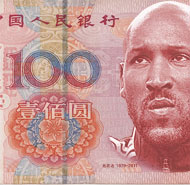Nicolas Anelka will soon be playing professional soccer in China. This is surprising because Nicolas Anelka is still a talented, effective soccer player who would help all but about 10 teams in the world. This is not surprising because Nicolas Anelka is going to a place where they’ll pay him an exponent of a number it’d take me years to count to.
 Many consider Anelka to be a mercenary. That’s what happens when you play for every English club, twice, and make a stop off in Turkey in between—all before you’re 30. In the sense that we can only try to characterize a soccer player’s career decisions with nothing more than a cursory knowledge of his decision-making process, it’s probably a fair label. But that’s not why his move to China isn’t surprising. Not-quite-past-their-prime players are moving to these money-rich, soccer-poor outposts more and more frequently with each passing transfer window. (Hi, Asamoah Gyan!) After all, this is a career—a fleetingly short one.
Many consider Anelka to be a mercenary. That’s what happens when you play for every English club, twice, and make a stop off in Turkey in between—all before you’re 30. In the sense that we can only try to characterize a soccer player’s career decisions with nothing more than a cursory knowledge of his decision-making process, it’s probably a fair label. But that’s not why his move to China isn’t surprising. Not-quite-past-their-prime players are moving to these money-rich, soccer-poor outposts more and more frequently with each passing transfer window. (Hi, Asamoah Gyan!) After all, this is a career—a fleetingly short one.
When I heard the news of Anelka’s move to Shanghai Shenua, I wasn’t surprised—but again, not because of his past moves. I wasn’t surprised because Nicolas Anelka has never seemed to me like someone who actually cared about the sport he plays for a living. And going to a low-level league that pays a ton of money fits that narrative I’ve built up in my head. Is this unfair? Yes. Do I care? Nope.
I’ve never liked Nicolas Anelka. I really don’t know much about him, personally … because I’m a 23-year-old living in Brooklyn, and he’s not. Nicolas Anelka could go play soccer on the moon, and I’d be happy. The further away he is from my life, the better.
Anelka has scored a lot of goals in his career, and he’s played for a lot of great clubs. In many ways, he’s had a very successful career, but he is the last player I’d ever want to have to root for.
He plays the game with the emotion of a once-petulant dead robot. There are some guys—namely, Mario Balotelli—who make it a point to show no emotion, turning that into a kind of emotionless emotion. For Anelka, though, the lack of emotion is exactly that: a lack of emotion. Is he really dead inside, wandering the field with nothing more than a desire for the clock to stop running? I have no idea, but that won’t stop me from believing it.
In a general sense, we can divide every soccer player ever into two categories: those who have to try really hard to succeed, and those who don’t. We love the first group because we see ourselves in them. Somehow, Lionel Messi falls into this group. (And that’s why we all love him. Yes, you love him, too.) For the second group, we’re amazed at how easily they pull off supposedly impossible things. Xabi Alonso does such things routinely.
Anelka fits into this second group. He glides around the field, cuts past defenders easily, and strikes the ball harder than his approach should ever allow. But that effortlessness disappears when an opponent closes him down. He’ll run at a defender and the ball will pop out to a teammate at the last second. When Carlo Ancelloti tried playing Anelka as the playmaker in a four-man midfield, he had to make quick decisions and play without much space, and it was hard to watch. The moments where he struggled became the norm.
Watching Anelka at full stride, cutting in from the sideline—that’s something I can appreciate, because it’s sort of breathtaking, but when it comes to anything more than that, his game is frustrating, an internal stumbling that’s just hard to look at, whether or not it actually succeeds. It’s effortlessness held for a second too long that makes you scream at your television.
Nicolas Anelka has never brought joy to my life. (And yes, the “LeSulk”-ness and his hijinks in South Africa don’t help.) For all I know, outside of soccer, he’s just a really great dude who’d want to be my best friend in some alternate universe. Maybe he really does care about the game, too.
But I don’t think that actually matters. I know Anelka as a soccer player, not as a brother, son, father, or whatever else he does when he’s not pissing me off. The personality I create for him—and we all do this when we watch sports—is realer, to me, than whatever his real personality is.
Good riddance, my nemesis.
Ryan O’Hanlon is the sports and managing editor for the Good Men Project. He used to go to college and play soccer. He’s still trying to get over it.
Read More: China, Nicolas Anelka
by Ryan O'Hanlon · December 16, 2011
[contact-form 5 'Email form']